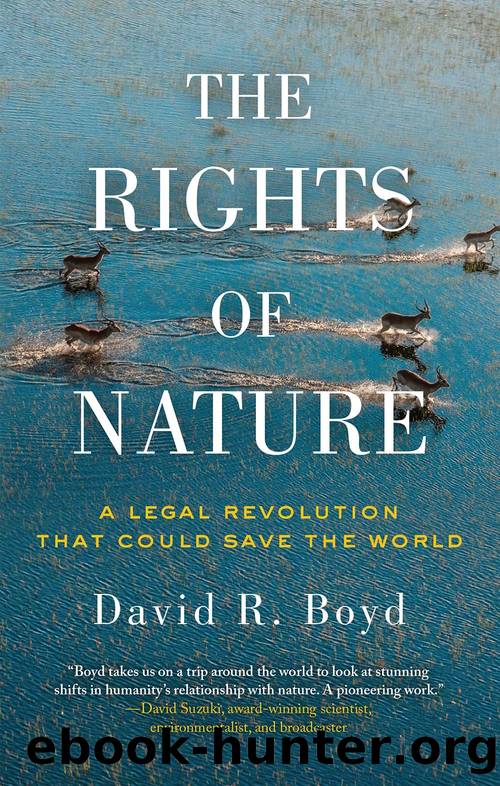The Rights of Nature: A Legal Revolution That Could Save the World by David R. Boyd

Author:David R. Boyd [Boyd, David R.]
Language: eng
Format: epub
Tags: Animal Rights, Conservation & Protection, Environmental, Law, Nature, Non-Fiction
ISBN: 9781770909663
Google: 6mS1DgAAQBAJ
Amazon: B06ZZYPL8X
Publisher: ECW Press
Published: 2005-09-16T23:00:00+00:00
Chapter 8
A River Becomes a Legal Person
Ko au te awa, ko te awa ko au.
I am the river, and the river is me.
Māori expression
Until recently, every square foot of land on Earth outside Antarctica and Bir Tawil was owned by humans. A single species among tens of millions of species, Homo sapiens, purports to hold title to it all. The first small, pioneering cracks in this ubiquitous assertion of human ownership occurred in New Zealand, thanks to recent changes that begin to incorporate Māori worldviews into the legal system. Aotearoa is the Māori name for the country, meaning “land of the long white cloud.”
Aotearoa/New Zealand is a small country that has occasionally demonstrated global leadership on fundamental issues of rights. Back in 1893, it became the first country in the world to recognize that women had the right to vote. In the twentieth century, it was the first country to have a female prime minister, chief justice, and governor general at the same time. More recently, Aotearoa/New Zealand has become a pioneer in recognizing the legal rights of ecosystems—first a river, and then a national park. These internationally important precedents emerged from negotiations between the national government and the Māori people. The agreements, and the laws that implement them, reflect and incorporate Māori cosmology. Although the Māori worldview is unique, it shares many elements with other Indigenous cultures, particularly in terms of the human relationship with nature. Their perspective is starkly different from the Western system of human exceptionalism, anthropocentrism, and separation from nature.
Aotearoa/New Zealand’s revolutionary recognition of the rights of nature has roots in the nineteenth century. After arriving from Polynesia in canoes, Māori had lived on Aotearoa for a thousand years prior to the arrival of European explorers and settlers. In 1840, the Treaty of Waitangi led to the British assertion of sovereignty over New Zealand. The negotiation of the treaty was fraught with the challenges one might expect in an exchange between profoundly different cultures, exacerbated by linguistic barriers. There was also clear evidence of fraud, with intentionally different versions of the text prepared in English and in Māori. For example, in the English version the Māori cede sovereignty to the Crown, while the Māori version guarantees tino rangatiratanga (absolute authority) to the Māori. These deceptions and misunderstandings are still being sorted out today, nearly two centuries later.
The Waitangi Tribunal is a permanent government commission established in 1975 to investigate Māori claims about wrongful acts of the Crown. The tribunal conducts hearings, reports its findings, and offers recommendations to guide future negotiations. While the government is not legally bound by the tribunal’s suggestions, most settlements have been consistent with tribunal direction.
To Māori, nature is not simply property or a source of natural resources. There are two important and interrelated concepts at the heart of the Māori relationship with nature that are profoundly different from Western philosophy—whanaungatanga and kaitiakitanga, loosely translated as kinship and stewardship. Whanaungatanga is actually broader than kinship in the sense that it relates not
Download
This site does not store any files on its server. We only index and link to content provided by other sites. Please contact the content providers to delete copyright contents if any and email us, we'll remove relevant links or contents immediately.
The Secret History by Donna Tartt(16627)
The Social Justice Warrior Handbook by Lisa De Pasquale(11489)
Thirteen Reasons Why by Jay Asher(7788)
This Is How You Lose Her by Junot Diaz(5774)
Weapons of Math Destruction by Cathy O'Neil(5038)
Zero to One by Peter Thiel(4824)
The Myth of the Strong Leader by Archie Brown(4789)
Promise Me, Dad by Joe Biden(4449)
Beartown by Fredrik Backman(4419)
Stone's Rules by Roger Stone(4416)
How Democracies Die by Steven Levitsky & Daniel Ziblatt(4399)
The Fire Next Time by James Baldwin(4343)
100 Deadly Skills by Clint Emerson(4079)
A Higher Loyalty: Truth, Lies, and Leadership by James Comey(4033)
Rise and Kill First by Ronen Bergman(4012)
The David Icke Guide to the Global Conspiracy (and how to end it) by David Icke(3883)
The Farm by Tom Rob Smith(3872)
Secrecy World by Jake Bernstein(3783)
The Doomsday Machine by Daniel Ellsberg(3731)
